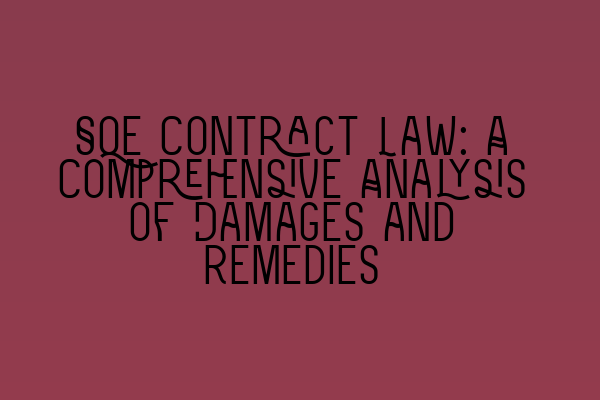SQE Contract Law: A Comprehensive Analysis of Damages and Remedies
Welcome to our comprehensive analysis of damages and remedies in SQE Contract Law. In this blog post, we will delve into the intricate details of this area of law and explore the various types of damages available to parties in a contract dispute, as well as the remedies that can be sought in such cases.
But before we dive into the specifics, it’s important to have a basic understanding of what constitutes a contract and the importance of damages and remedies in contract law.
Understanding Contracts
A contract is a legally binding agreement between two or more parties that outlines the obligations and rights of each party involved. Contracts provide stability and predictability in business transactions, ensuring that all parties are aware of their responsibilities and can seek legal recourse if those responsibilities are not fulfilled.
Contracts can be oral or written, but it is always advisable to have a written contract to avoid any ambiguities or misunderstandings that could arise in the absence of clear documentation. A well-drafted contract is essential in preventing contract disputes and facilitating smooth business operations.
Damages in Contract Law
Damages are the monetary compensation awarded to a party who has suffered loss or harm as a result of a breach of contract. The purpose of damages is to restore the non-breaching party to the position they would have been in had the breach not occurred.
There are several types of damages available in contract law, and the specific type of damages sought depends on the nature of the breach and the losses incurred:
- Compensatory Damages: Compensatory damages aim to compensate the non-breaching party for the losses they have suffered as a direct result of the breach. These damages can include both direct and indirect losses, such as financial loss, loss of profit, or loss of reputation.
- Consequential Damages: Consequential damages are awarded to the non-breaching party for losses that were not directly caused by the breach but are a foreseeable result of the breach. These damages can include additional costs incurred as a result of the breach or loss of future business opportunities.
- Punitive Damages: Punitive damages are rare in contract law and are only awarded in exceptional cases where the breaching party’s conduct is considered particularly egregious. The purpose of punitive damages is to punish the breaching party and deter them from engaging in similar behavior in the future.
It is important to note that the primary aim of damages in contract law is to compensate the non-breaching party rather than punish the breaching party. The goal is to restore the injured party to the position they would have been in had the breach not occurred.
Remedies in Contract Law
In addition to damages, parties in a contract dispute may seek other remedies to address the breach and rectify the situation. While damages are the most common form of remedy, there are other remedies available depending on the circumstances:
- Specific Performance: Specific performance is a remedy that requires the breaching party to fulfill their obligations under the contract exactly as stipulated. This remedy is typically sought when the subject matter of the contract is unique and cannot be easily replaced with monetary compensation.
- Rescission: Rescission is a remedy that allows the parties to cancel the contract and be released from any further obligations. This remedy is often sought when there has been a fundamental breach of contract or if the contract was entered into based on fraud or misrepresentation.
- Reformation: Reformation is a remedy that allows the court to modify the terms of the contract to reflect the true intentions of the parties. This remedy is typically sought when there has been a mistake or ambiguity in the contract that needs to be corrected.
Each of these remedies serves a different purpose and may be appropriate depending on the circumstances of the contract dispute. The choice of remedy will depend on the specific facts of the case and the desired outcome of the non-breaching party.
In conclusion, damages and remedies play a vital role in SQE Contract Law. They provide a means of recourse for parties who have suffered harm as a result of a breach of contract and ensure that the fundamental principles of fairness and justice are upheld in business transactions.
If you found this analysis of damages and remedies in SQE Contract Law insightful, you may also be interested in reading our related articles:
- Mentorship for Aspiring Solicitors: Nurturing Talent in the Legal Field
- Legal Challenges and Pitfalls: Navigating the Complexities of the Legal System
- Striking a Balance: Work-Life Harmony in the Legal Field
- Demystifying the Solicitors Qualifying Examination (SQE): What You Need to Know
- Embracing Diversity: Advancing Inclusivity in the Legal Profession
We hope you found this comprehensive analysis helpful. If you have any questions or require legal assistance, please feel free to reach out to our team at SQE Contract Law.
